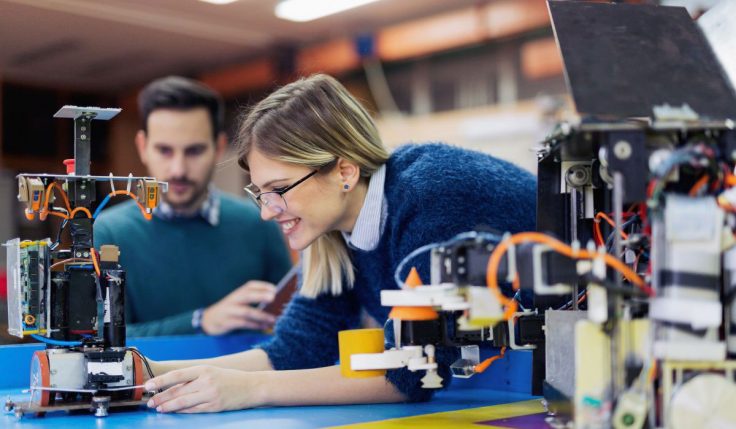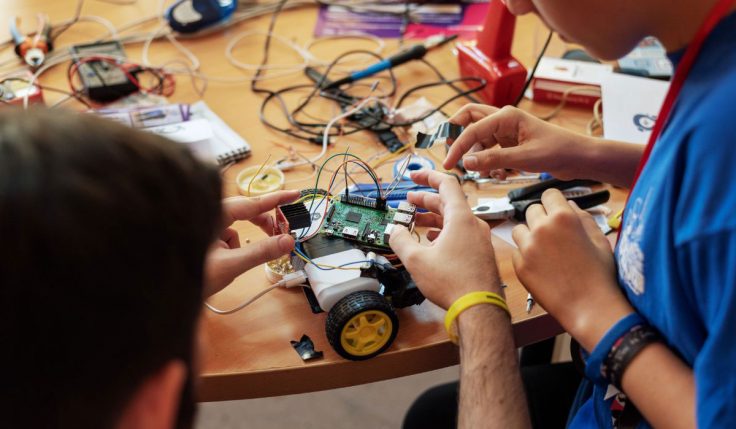AI or Artificial intelligence is barely out of reach of everybody’s mind nowadays. It is one of the most popular areas of expertise for job seekers. For many of us, the term AI recalls sci-fi fantasies and dread about robots controlling the world. It is already around us all the time. From our search results to the way we shop, from Siri to Alexa, from Flipkart purchase recommendations to Spotify music suggestions, AI is everywhere. According to the latest data, the market size of artificial intelligence is projected to reach $641.3 billion by 2028 which is a more than 10-fold increase from the current value of $51.08 billion. Before we dive deep into why AI is the future, let us start with the basics.
What is AI?
The most basic definition of Artificial Intelligence from Britannica states, “It is the ability of a digital computer or computer-controlled robot to perform tasks commonly associated with intelligent beings.” AI has become an overall term for any advancements in technology and computing systems in which computer programs solve problems that require reasoning associated with human intelligence like learning from past processes.
Algorithm vs Artificial Intelligence
There is a key distinction between algorithms and AI. Algorithms are just set of instructions, a formula to process data. The key component of Artificial Intelligence is the ability to learn. AI is made up of a set of algorithms that can change and rewrite themselves in response to the input data, hence proving “Intelligence.”
Also Read: Artificial Intelligence: Redesigning Design?
The Impact of AI on Society
Digital life is expanding human capabilities and disrupting old human activities. Computer systems have spread all around the world. When AI takes over the repetitive tasks from humans, it frees up the human’s time for the work that they are well equipped – tasks that require creativity and empathy. If humans do work that is more engaging, it will automatically lead to happiness and job satisfaction.
Applications of AI in Diverse Sectors
AI is likely to have a strong impact particularly on certain sectors: –
Finance: Investments in financial AI have increased by numerous folds in the last decade. According to the experts, decisions about loans are being made by software that takes into consideration a variety of finely parsed data about the borrower rather than just credit score. One of the most prominent examples of the impact of AI in finance is the stock exchange market. Human decision-making is replaced by high-frequency trading machines. Fraud detection is another way in which AI is useful in financial systems. It identifies abnormalities, unusual cases requiring additional investigation, and outliers.
Healthcare: The potential benefits of utilizing AI in the field of medicine have already been explored. The medicine industry has innumerable and robust amounts of data that can be utilized to create predictive models in healthcare. AI is helpful because it can detect potential challenges and notify the care team quickly, enabling them to discuss options, providing faster treatment solutions, and ultimately saving lives.
Also Read: Top 5 Jobs After Btech In Data Science And Artificial Intelligence
Transportation: Transportation is the sector where machine learning and AI are showing major innovations. Autonomous vehicles and navigation are the best examples to learn how AI can impact the transportation sector. Autonomous vehicles – cars, buses, and drone delivery systems use features of advanced technology. These features include automated vehicle guidance and braking, the use of cameras and sensors to avoid collisions, lane-changing systems, and the use of high-performance computing to adapt to instant circumstances through detailed maps.
Criminal justice and cyber security: Experts claim that AI programs have reduced human biases in law enforcement which leads to a fairer sentencing system. Cyber security is a major concern for many business leaders, especially considering the spike in cyber fraud throughout 2020. The cyber-attacks rose by 600% during the pandemic as the hackers capitalized on the work-from-home culture. AI is helping under-resourced security operations to stay ahead of threats.
Also Read: What Is Cyber Security? Definition & Best Practices
E-Commerce: E-commerce companies like Amazon uses machine learning to improve the selection of products, user experience, and logistics optimization. Machine learning techniques help businesses develop strong client interactions and connections. AI will continue to drive the e-commerce sector by the use of chatbots, shopper personalization, inventory automation, and image-based targeting.
AI and the future
Some of the most intriguing AI research and experimentation that will have a future impact are sustainability, climate change, and environmental issues. Using sophisticated sensors, cities will become less polluted, less congested, and more livable. AI is expected to have ramifications on every industry imaginable. We are already seeing AI in our cars, smart devices, and healthcare systems and we will continue to see its influence in other industries for the foreseeable future. AI will also have a big impact on job search. Resume scanning is being done by AI-powered programs reducing the time and effort of hiring managers. AI is here to stay, and its research is so promising that it is difficult to imagine a world without it. From self-driving vehicles to space travel, AI has a long way to go.
Artificial Intelligence and Machine Learning are at the top of the list of most important skills in today’s job market. Jobs requesting AI or machine learning skills for recruitment are expected to increase by ~70% in the next five years.
Also Read: What Is Artificial Intelligence And Future Scope
One of the absolute prerequisites for AI to be successful in any sector is that we invest tremendously in education to retrain people for new jobs. Students need to learn about programming languages like they learn any new language and this is to be done as early as possible because AI is the future. One of the best places to train oneself in Artificial Intelligence is Chitkara University. It offers a B.E. in Computer Science Engineering with specialisations in Artificial Intelligence and Machine Learning (AI & ML). It is a 4-year intensive learning experience with ample theoretical knowledge and practical skill development opportunities. With multiple forces like academic reputation, top rankings, qualified staff, and an amazing learning environment, Chitkara provides the best of everything.






